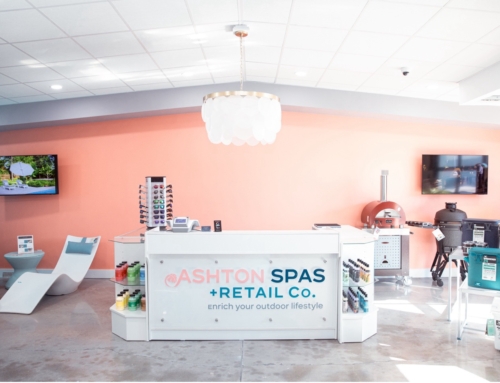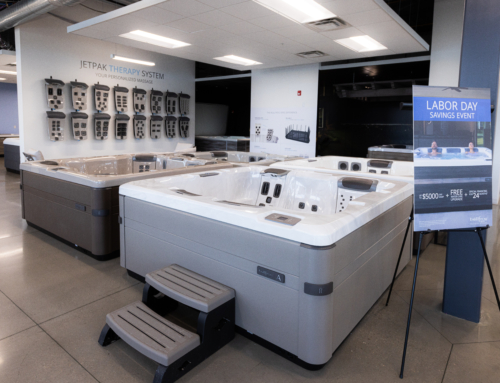A recent Spa Retailer article looked at three spa retailers’ different approaches to retaining commercial space, addressing the question: to buy or to lease. In a recovering economy with interest rates on the rise, hot tub dealers face this eternal business decision once again. However, retailers across the country have long debated the merits of both renting and owning, to no certain conclusion.
In this article, we’re going to provide insight that will help a spa retailer make such a significant decision.Whether starting a new business from scratch, expanding, or relocating, dealers must consider the role commercial space plays both in day-to-day operations, as well as in the long-term strategy.
Evaluating Your Options
Before entering any new lease or purchase agreement for commercial space, it’s essential to consider where your business stands, what its goals are, and how much you can afford to spend. Before any decisions are made, you’ll want to ask yourself a few preliminary questions:
-
How long have you been in business?
Clearly, the longer you have been in business, the more information you have to base your decision. According to the US Small Business Association, new establishments should weigh their options more carefully and assess the potential of every location they consider, including demographics, zoning laws, proximity to suppliers, and the cost of doing business in the area.
-
How much working capital have you raised?
Assets are important whether you’re buying or renting. Steadier cash flows offer more stability and bigger bargaining chips, which put your business in a better position to buy. The less capital available, the less you’re in a position to invest.
Before entering any new lease or purchase agreement for commercial space, it’s essential to consider where your business stands, what its goals are, and how much you can afford to spend.
-
Do you have a strategy for growth or expansion?
Where do you realistically see your spa business in the next five to ten years? Your decision to own or rent is affected by your long-term plans and whether or not your business is a viable investment.
-
How do you plan to use your commercial space?
Before you begin looking for a new location, have an idea of how you would like to use the space. Do you need showroom space, offices, loading docks, or parking? Knowing what you need in a location will factor into your decision to rent or own, including additional construction costs and zoning restrictions.
-
How important is location to your business?
The right location can mean different things to different companies. If business relies heavily on foot traffic and walk-in sales, location factors heavily into your decision. On the other hand, distribution-based retailers may set up operations in closer proximity to suppliers to reduce transportation costs.
Keep your answers to these questions in mind throughout the commercial leasing or buying process. In searching for a new location, when you know what you need, the better the chances of finding something you want.
For Uncertain Retailers, Leasing Offers a Way to Build for the Future
After reviewing your current situation, you may discover that now is not the time to buy. Leasing offers many benefits to new and sustaining businesses looking to lower overhead costs, limit liability, and plan for the future.
Limited Working Capital
Commercial leases are often advantageous for businesses with limited working capital. Startups or established businesses looking to increase operations typically do not have enough cash on hand to both build their companies and invest in property.
Avoiding the costs involved with owning and developing commercial real estate can help new and growing businesses build wealth and stability, placing them in a better position to buy in the future if they choose to do so.
Commercial Space Without the Burdens of Owning
When businesses decide to rent, they often credit their decision to not dealing with the hassle of owning: permit fees, property taxes, maintenance costs, cleaning–the list goes on.
Speaking with Elizabeth Hofmann, co-owner of Accent Spas in Medford, OR, she shared that “We needed new heating and air conditioning units in the chemical room, to a tune of $42,000. We did not pay any of it–our landlord did.” Had she owned the building, she (or the insurance company) would be left to cover the bill, a burden often too great for many new and growing companies.
When Leasing Has Its Limits
While leasing can help businesses build working capital, it also has the potential to restrict growth. From troublesome landlords to rent increases, lease agreements can introduce a whole new set of challenges and limitations for business owners.
Unresponsive Landlords
That persistent leak in your storefront may be the bane of your existence, but, from your landlord’s perspective, it’s just another item on the to-do list. In most cases, your business and your landlord do not share the same priorities.
From landlord responsibilities to operating expenses, there are dozens of ways renting can cost your business more than expected.
Many businesses are frustrated by their dependence on a landlord. In that same conversation with Mrs. Hofmann, regarding her landlord, she added, “We had mentioned [the A/C problem] for three years, trying to be a ‘good tenant.’ [Finally], we sent…a firm but [polite] letter, and he replaced the units within a month.” Though their issue was resolved eventually (and at no cost to them), ultimately getting the work done was out of their hands.
Renewal Clauses
When signing a lease, it’s important to review the agreement carefully. According to an article released by the Business Development Bank of Canada, contracts with the option to renew should be handled with extra attention, especially if your business needs time to grow. Short renewal terms mean rents could rise sooner than expected, forcing you out of the location prematurely.
Whenever you enter into a leasehold, always have your attorney review the terms. From landlord responsibilities to operating expenses, there are dozens of ways renting can cost your business more than expected.
Investing for the Future With Commercial Real Estate
The decision to purchase commercial space is a logical step to take for many established spa retailers looking to accrue capital, build personal wealth, or commit to a particularly profitable location. There are obvious risks to ownership; however, if done correctly, it can help lower costs and increase your bargaining power.
Improved Business Operations
As a property owner, you no longer need to go through a landlord to make changes to the building. Fix repairs as needed, build to suit and operate within budget; free of leasehold restrictions, your business can prioritize building operations on a more suitable schedule.
Similarly, if leasehold improvements are becoming too costly, you can pour profits into a sunk cause. Owning your space can avoid these money pitfalls.
Accrue Personal Wealth and Free up Capital
Investing in commercial property can increase your net worth, adding an asset to the books. And without rent checks to send, you have more working capital on hand. Additionally, many businesses buy a space larger than needed, renting out the unused portions to commercial tenants, reducing operating costs.
Location, Location, Location
You’ve heard about the importance of location in the spa business before–it’s nothing new. Location is important, especially when thinking about purchasing. Though not always an option, when you do have a prime location within your grasp, be sure find out more information on how to purchase the property.
With Ownership Comes Responsibility
When you own real estate, you assume total responsibility for the property, including maintenance, damages, taxes, and even its resale. Needless to say, businesses should reconsider purchasing property if they are not fully prepared to handle the financial and time commitments involved in ownership.
Buyer’s Remorse
One of the worst situations a growing retailer can find itself in is owning a property that doesn’t meet their basic business needs. In an interview with Spa Retailer, Joe Privett, co-owner of San Juan Pools & Spas in Pekin, IL, describes how he purchased more than he bargained for:
Even though the location was perfect, nearly nothing else about this transaction was…[There were] zoning issues; suing…the general contractor before construction even began; engineers who were slow to make changes…; and a renovation that ended up costing double the estimate.
Unforeseen costs are often neglected in the buying decision and can quickly put your business in the red. Before closing, make sure the space suits your needs and plan a budget for potential construction costs and legal fees.
Unforeseen costs are often neglected in the buying decision and can quickly put your business in the red.
Uncertain Interest Rates
Finally, as the economy gains ground from the recession, interest rates are likely to climb over the coming years. Many young entrepreneurs have only experienced the record low rates of recent years and are in for a rude awakening once rates begin to climb higher. Before making any commercial real estate investment, assume you will see higher rates in the future.
Timing Is Everything
The most important factor in deciding whether to buy or lease is time. Understanding your business situation and knowing when to act informs the choices you make. Ask yourself these questions:
- Are rents increases likely in the near future?
- Are your growth projections steady enough for a major investment?
- Can your business tolerate the cost of relocating, including productivity losses?
Moving prematurely into a new commercial space, either owned or leased, can end up costing you more than it earns. Before jumping into any agreement, always speak with an attorney and read every contract diligently. In finding commercial space, understanding and evaluating your current situation are your strongest allies.









Leave A Comment